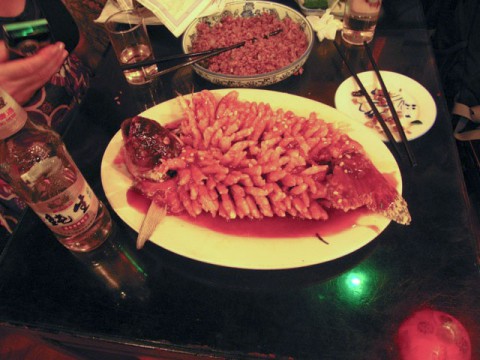Joshua writes:
My dad just got back from Beijing. At one restaurant, they brought out a live fish in a bucket for inspection, and upon his OK returned 10 minutes later with this. The elongated cheese-it looking things all over the fish were some kind of fried dough and the fish meat, maybe, he couldn’t tell, but it was very good. He’s trying to figure out what this dish is. Have you ever seen anything like it?
Hi Joshua,
That’s a classic dish that’s supposed to resemble a pine cone (whole fish) or chrysanthemum blossoms (smaller filleted pieces). It’s usually just translated as “deep-fried fish in pine cone/chrysanthemum shape.” It maximizes crunch while making it very easy to eat with chopsticks. There’s also something to be said for the dramatic presentation.
I can’t tell from the photo, but classically, it’s a flaky white-fleshed fish. Grouper is a favorite, an expensive delicacy in Asia. In English, the fish needs to be “round” — so no flounder or halibut.
The two fillets are removed from the back bone, and the flesh is cross-hatched down to the skin (much like mangoes that have that porcupine-like cube-spiked halves). The fish fillets are battered (egg, chicken stock, water caltrop starch), dusted generously with more caltrop starch and then deep-fried. The skin turns inside out as each “petal” fries up. The head and spine are fried, and then the whole fish is reassembled, albeit the fillets are backward, with the skin-side down.
To complement the crispy fried texture, the sauce is usually a sweet-and-sour one based on tomato ketchup, sugar, vinegar, lime and maybe preserved plums or dried haw fruit. It’s simmered separately and then drizzled over the fish just before serving.
In China and Vietnam, you’ll also see this cross-hatch pattern on squid, especially for wedding or new year banquets. Pain in the ass to do every single little piece, but the dishes always look stunning.
Thy
